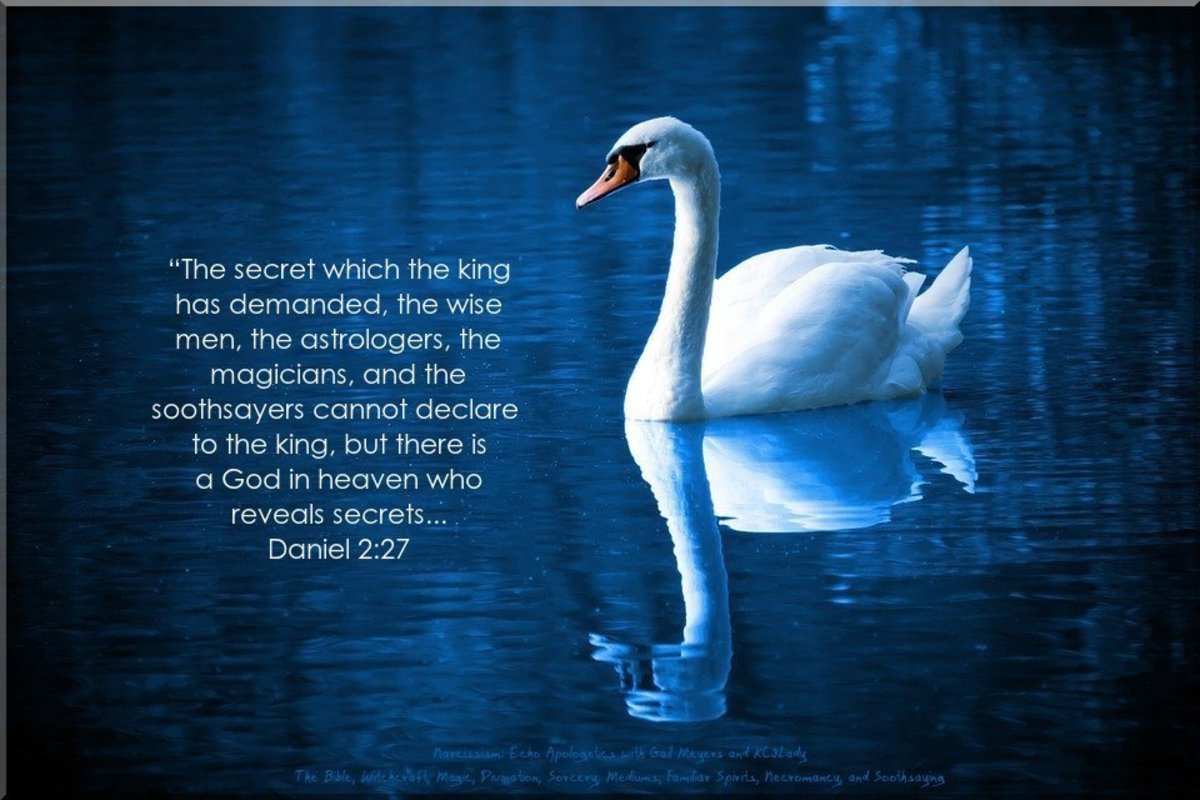The Bible and the Paranormal
Is the Bible OK with dabbling in the supernatural?
The Bible and the Paranormal
Untold millions around the world say they believe in ghosts and inexplicable psychic phenomenon. A recent poll by the Pew Research Center suggests that 45% of Americans believe in ghosts (pewresearchcenter.com, 10/31/2013). The same poll indicated that no less than 18% say they’ve actually seen a ghost, and 29% say they have been in contact with the dead. An equally recent Harris poll put the number of those believing in ghosts at 42%, astrology at 29%, reincarnation at 24%, and witches at 26% (harrisinteractive.com, 12/16/2013). Though the statistics may vary, it is clear that many still believe in some form of paranormal activity. Some might consider these statistics surprising in light of the fact that many Americans consider the United States to be a “Christian nation.” Most of those surprised at this data would probably consider such beliefs to be in conflict with the teachings of the Bible.
Do ghosts really exist? Do the spirits of the dearly departed make themselves known on occasion in the form of eerie sounds or translucent appearances? Can some people really communicate with the dead as a medium? Do some really have psychic abilities taking them a step or two beyond the realm in which the rest of us live?
Many who claim a belief in God and the afterlife see no conflict between Christianity and belief in the paranormal. The essential question facing those in this category is simple: what does the Bible say about matters such as ghosts, psychic ability, and reincarnation, and is it consistent with the Christian faith to believe in them?
The Paranormal in Biblical History
The practice of such things as sorcery and necromancy apparently date to very early times in mankind’s civilization. In almost every case, a study of the history of tribes and empires reveal some sort of belief in the supernatural, and a caste of holy men or priests was organized in an attempt to manipulate the unseen forces which interacted with man. As civilizations evolved, the varied practices did as well, and some empires developed extremely elaborate religions involving the occult. The earliest civilizations in the Bible - the Chaldeans, Egyptians, and the various ethnic groups within Caanan - all practiced some sort of divination and demon worship in an attempt to sway the gods.
In stark contrast stood the Israelites. They viewed such practices as an abomination and something to be avoided at all costs. According to the Bible, this was because God wanted His people to understand that He alone ruled heaven and earth, and that man could do little to manipulate the course of nature or history through his own devices, specifically magic (Deut. 18:9-12; Dan. 4:34-35). God alone was to be the source of their strength and hope, and unlike the gods of the pagans, He was not fickle or capricious in His dealings, nor demanded such harsh rituals as human sacrifice or sexual debauchery to placate Him.
A Definition of Terms
Perhaps it would be best to take time and define the terms usually brought to bear upon a study such as this. Bear in mind that the following are practices addressed at some point in Scripture, and sometimes the terms overlap:
Divination - The act or practice of attempting to uncover hidden knowledge
through occult means. It usually has a sinister connotation, and
serves as an umbrella term for the following, which are forms of
divination.
Necromancy - The alleged practice of communicating with the dead. It
usually entails receiving knowledge from the dead which is unknown
or unavailable to the living.
Astrology - A belief system which holds that heavenly bodies such as stars,
planets, the sun and moon exert an influence over one’s behavior and
destiny at the moment of birth. This is known as “judicial astrology”
as opposed to “natural astrology.”
Witchcraft - The practice of attempting to influence nature and human
behavior through the application of “black rites,” potions, and
the invocation of spirits. It is also known today as a form of neo-
paganism.
The Bible and Psychic Predictions
In Biblical times, what we would call psychic ability was rarely used for entertainment purposes. The priestly caste who mastered the art of sleight of hand usually performed before kings seeking guidance on matters of state.
When magicians and conjurers were put to a test they could not manipulate, the results were less than spectacular. For example, in Daniel 2:1-10 the Babylonian king Nebuchadnezzar forced his own magicians to prove the validity of their alleged gift. They failed miserably.
Troubled by a dream, Nebuchadnezzar demanded an interpretation from the court magicians. When they asked for details about the dream, the king refused to provide them. He reasoned that if they were truly gifted with divination, they would be able to tell both the details of the dream and the meaning. The diviners were stunned. “The astrologers answered the king, ‘There is no one on earth who can do what the king asks! No king, however great and mighty, has ever asked such a thing of any magician or enchanter or astrologer. What the king asks is too difficult. No one can reveal it to the king except the gods, and they do not live among humans’” (Dan. 2:10-11, NIV, as are all scripture citations). The magicians admitted that without input from the king, their abilities would fall short.
What Nebuchadnezzar’s diviners could not do, the prophet Daniel could. He not only revealed the king’s dream, but interpreted it (Dan. 2:19-45). Yet Daniel was quick to give credit to God alone, Whom he described as the revealer of secrets (Dan. 2:22).
This underscores what the Bible taught earlier in Israel’s history about those who claim insight into the mystical divide. In those days, such ability was granted only to those whom God had called into His service, usually as prophets. The test to be applied was simple and sure: if the thing predicted or revealed was proven false, then the one claiming such power was to be rejected and put to death. “But a prophet who presumes to speak in my name anything I have not commanded, or a prophet who speaks in the name of other gods, is to be put to death. You may say to yourselves, ‘How can we know when a message has not been spoken by the Lord?’ If what a prophet proclaims in the name of the Lord does not take place or come true, that is a message the Lord has not spoken. That prophet has spoken presumptuously, so do not be alarmed” (Deut. 18:20-22). A similar passage is found in Jeremiah 28:8-9, “From early times the prophets who preceded you and me have prophesied war, disaster and plague against many countries and great kingdoms. But the prophet who prophesies peace will be recognized as one truly sent by the Lord only if his prediction comes true.”
Contrary to what many psychics claim and demonstrate today, the Bible clearly states that in the days of the Bible, not one prediction or revelation from a true prophet would fail. There would be no need for probing questions, vague vision details, or the need to clarify. The vision and accompanying revelation would be precise and unfailing in every single occurrence.
The Bible and Astrology
Although many admit that they think there is something to astrology, others will giggle embarrassingly when asked, and claim they read their horoscopes for entertainment. They deny actually believing it, but rarely miss the daily astral counsel. In the back of their minds they have heard or read of such celebrities like Jeane Dixon or Sydney Omarr, and how amazingly accurate were their predictions from the zodiac. Nevertheless, the underlying questions for this discussion cannot be ignored: is astrology true, and what should be the believer’s attitude toward the practice?
Astrology, like astronomy, has ancient origins. Ever since man gazed with wonder towards the heavens the study of the celestial bodies was important. Perhaps the earliest Biblical reference to astrology is found in Genesis 11. There we read of the famous Tower of Babel, a huge building endeavor designed to keep the human race united and concentrated in one place. Biblical scholars also see a connection between Babel and ancient astrology. The term “Babel” itself originally meant “gate of God,” suggesting that the early Babylonians saw this place as the portal on earth from which one could access the heavens.
Scholars also contend that the early Babylonians were among the first astrologers. Indeed, the Chaldeans were known early on for their worship of the heavenly bodies. Through them, stars and constellations were given names.
By the second millennium B.C., Babylonian astrologers developed horoscopes in an attempt to predict what might happen each month. They also devised the zodiac, a division of the celestial sphere into twelve equal parts known as “signs” or “houses.” From there, the “science” of astrology only grew. By the 4th century B.C., Mesopotamian astrology had spread to Greece, and a century later was widely adopted by the Egyptians. The Romans absorbed astrology from the Greeks, and elevated it to the form of a religion. Thus one can see that the fad of modern astrology, so over-used by those in the entertainment industry and the “chic” west-coast for example, is really not new at all. In fact, it is one of the oldest religions and pseudo-sciences known to man.
Due to its early origin, it would be expected that references to astrology would be found in such books as Genesis, but it is certainly not limited there. The Hebrews were strictly forbidden to practice astrology, which in Biblical times was tied to astral worship, or worship of the heavenly bodies. Because of their unique relation with God, the Jews were not to be as the surrounding nations. “And when you look up to the sky and see the sun, the moon and the stars—all the heavenly array—do not be enticed into bowing down to them and worshiping things the Lord your God has apportioned to all the nations under heaven. But as for you, the Lord took you and brought you out of the iron-smelting furnace, out of Egypt, to be the people of his inheritance, as you now are” (Deut. 4:19-20).
By the time of the prophets, astrology was peaking in Babylon, and its influence was being felt among the Israelites themselves. Jeremiah and Isaiah warned against the practice of venerating the heavenly bodies and depending upon them for guidance. “The houses in Jerusalem and those of the kings of Judah will be defiled like this place, Topheth—all the houses where they burned incense on the roofs to all the starry hosts and poured out drink offerings to other gods” (Jer. 19:13). “All the counsel you have received has only worn you out! Let your astrologers come forward, those stargazers who make predictions month by month, let them save you from what is coming upon you. Surely they are like stubble; the fire will burn them up. They cannot even save themselves from the power of the flame” (Isa. 47:13-14).
The Bible clearly condemns the practice of astrology, and reveals its utter inability to guide or comfort those who follow it. Perhaps many people are eager to embrace astrology because they want their life to matter. They want it to mean something in an age of depersonalization. They want their birth to be significant, and the astrologers have told them that it is.
So has God. He has stated it clearly in His Word, and shown it beyond dispute in the death of His Son. Only here will one come to terms with the meaning of their life and destiny. Through the doorway of an empty tomb in Jerusalem life took on new meaning and hope came to live in the hearts of believers. It is not through astrology that we find comfort and guidance, but through God’s Spirit working through God’s word.
The Bible and Witchcraft
Witchcraft today is actually a form of neo-paganism. Neo-paganism is a religion which entails nature worship, or pantheism. It has a variety of core beliefs, but few of them are remotely close to traditional Christianity. Because it has been somewhat “modernized” and yet retains polytheistic views and the mysticism of the ancient cults, it is known as “neo-paganism,” or the “new paganism.” Witchcraft is one of its principle examples. However, while all witches are pagans, not all pagans are witches.
It is not known how many witches there are in the world, or in America for that matter. Any figure would be impossible to verify, since no census records are kept on witches. The American Religious Identification Survey states that the number of self-identified Wiccans increased to 342,000 in 2008, up from 134,000 in 2001. At this time, the 2008 figures are the most recent available. Despite the ambiguity of its membership, Wicca is officially recognized as a religion by the U.S. government.
There are persistent misconceptions about modern witchcraft. For example, belonging to a coven is optional, and covens do not have to be comprised of 13 people. Generally, witches do not believe in a personal Devil, and thus do not claim to worship him. A male witch is not called a “warlock” or “wizard.” He is a witch. They do not always dress in black, nor sit around a boiling caldron casting spells. Most do not attempt to hide the fact that they are witches. Indeed, modern witches claim to lead lives as good citizens, and could theoretically be your next door neighbor. They follow the Wiccan Rede, a statement of principles. Their common maxim is “Do as you will, but harm none.”
Much of our conceptions concerning witchcraft comes from dark episodes in our history. For instance, from June through September of 1692, nineteen men and women in Salem Village, Massachusetts were executed for the crime of witchcraft. This became known as the infamous Salem Witchcraft Trials, and is a blight on early American history, for most - if not all - of the people executed were undoubtedly innocent. Witches are quick to point out these travesties, and plead for tolerance, understanding and acceptance. But what does the Bible have to say about witchcraft?
There are clear prohibitions against witchcraft in the Old Testament. It is true that the witchcraft practiced in the days of the Old Testament was a bit different than that practiced today. Old Testament witches engaged in demon-worship, and practiced a variety of divination using cultic rituals. For this reason they are also referred to as sorcerers, mediums, and spiritists. Nevertheless, lying at the core of witchcraft both past and modern is idolatry and paganism. Witchcraft does not recognize a one supreme God of heaven and earth to which all must one day give account. It finds itself at odds with the Bible on such things as sin, atonement, and salvation. In this sense, the Bible would consider witches to indeed be in league with the Devil, even though they deny his existence.
The Old Testament unreservedly depicts the witchcraft of its day as anything but harmless. In fact, its judgment against the practice is framed in what many today would regard as shocking language. “Do not allow a sorceress to live” (Exod. 22:18). “Do not turn to mediums or seek out spiritists, for you will be defiled by them. I am the Lord your God” (Lev. 19:31). “I will set my face against anyone who turns to mediums and spiritists to prostitute themselves by following them, and I will cut them off from their people” (Lev. 20:6). “Let no one be found among you who sacrifices their son or daughter in the fire, who practices divination or sorcery, interprets omens, engages in witchcraft, or casts spells, or who is a medium or spiritist or who consults the dead. Anyone who does these things is detestable to the Lord; because of these same detestable practices the Lord your God will drive out those nations before you” (Deut. 18:10-12).
The New Testament speaks to the practice of witchcraft as well. “The acts of the flesh are obvious: sexual immorality, impurity and debauchery; idolatry and witchcraft; hatred, discord, jealousy, fits of rage, selfish ambition, dissensions, factions and envy; drunkenness, orgies, and the like. I warn you, as I did before, that those who live like this will not inherit the kingdom of God” (Gal. 5:19-21). Notice that the practice of witchcraft is likened to acts such as debauchery, idolatry and drunkenness. “But the cowardly, the unbelieving, the vile, the murderers, the sexually immoral, those who practice magic arts, the idolaters and all liars—they will be consigned to the fiery lake of burning sulfur. This is the second death” (Rev. 21:8). It should seem apparent that the Bible does not view witchcraft as harmless modern paganism. The wording is simply too strong for any such misconception.
Finally, no article on the Bible and the paranormal would be complete without the mentioning of ghosts.
The Bible and Ghosts
It would be difficult to find anyone who hasn’t read a good ghost story or seen one at the movies. They are such a part of our cultural folklore that nearly place you go someone has a ghost story or two. The Bible itself has at its core the fact that there is life after death. Given that, is it really too hard to believe that perhaps some souls live on in our own plane of existence and sometimes, at the right moment, in the dark and quiet hours, make themselves known?
The belief in ghosts transcends the continents and cultures. However, there are some differences in the purpose and nature of ghosts, depending on where you are in the world. In the West, most who believe in ghosts consider them to be restless souls unable to find peace after death. This is often because the spirit has unfinished business, or is for some reason trapped between worlds. Asian cultures generally believe in reincarnation. For them, a ghost is a soul that for some reason refuses to be “recycled.” In Chinese tradition, a ghost can either be reincarnated or become immortal as a demigod. It can also go to hell for eternity.
It is clear that various peoples and cultures in Biblical days (both Old and New Testament) believed in the existence of ghosts. However, there was no general consensus on the matter, and one could find different viewpoints on life after death even among the Jewish rabbis. The Jews believed that the dead could exist as rephaim, the Hebrew term for “ghosts of the dead.”
Some will point out that the term rephaim is actually found in the following Old Testament passages: Job 26:5-6; Psalm 88:10-11; Proverbs 21:16; Isaiah 26:19; 29:4. Though true, this does not confirm a belief in ghosts and poltergeists as many hold today. The writers of scripture often employed a variety of literary devices to convey the truth of a given point. These literary expressions usually call for a non-literalistic understanding. In other words, the writer never intended for his words to be taken literally. In the examples above, the passages underscore God’s sovereignty over death (Job 26:5-6); the fact that service and praise to God as a testimony before others can be rendered only on this side of the grave (Ps. 88:10-11); a general reference to the realm of the dead (Prov. 21:16); a coming resurrection (Isa. 26:19); or how God’s enemies will be brought low in battle (Isa. 29:4).
Isaiah paints a vivid picture of “life in the afterlife” when he addresses the King of Babylon and predicts his defeat before God: “The realm of the dead below is all astir to meet you at your coming; it rouses the spirits of the departed to greet you — all those who were leaders in the world; it makes them rise from their thrones — all those who were kings over the nations” (Isa. 14:9). It should be obvious to even the casual reader that Isaiah is using a satirical taunt to underscore the coming judgment from God upon the Babylonian kingdom.
The New Testament has references to what appears to be a common belief in ghosts. The disciples themselves seem to have fallen to this superstition, which manifested itself twice in regards to Christ. This can be seen in the following passages: Mark 6:45-52 (see also Matt. 14:25-26); Luke 24:36-39. It must be noted that such occurrences took place prior to the commissioning of the apostles, for from that point, no superstitious acts or words are attributed to them (except for a possibility in Acts 12:15, but the passage does not mention any of the Twelve per se as being present, and Peter was thought to perhaps be an angel instead of a ghost).
With the exception of the Transfiguration (Matt. 17:1-3), the dead are never seen as interacting with the living, nor is the possibility ever considered. Even at the Transfiguration, the dead in this case (Moses and Elijah) spoke only with Christ (the disciples seem to have been ignored), undoubtedly about the glories which should follow Him. In addition, the disciples were immediately forbidden to engage any act commemorating interaction with the dead (Matt. 17:4-6).
Conclusion
Why do people believe in ghosts? For many, there is perhaps comfort in believing that the afterlife provides an opportunity to go on, to make amends, to reach out to loved ones or others in this life. If ghosts exist, then those who have passed on before us are never really gone. Perhaps many do not want to relinquish their hold on this life, or more accurately, the hold of this life on them. Perhaps they want to believe that the here and now can be interacted with, even after death.
Life is indeed interacted with, but not by the souls of those who have died. Only God assumes the prerogative of directing the course of life, and He does so with the welfare of His saints in mind. Only he can span the realms of the living and the dead, and rules both in wisdom and justice.
Life does go on after death in one form or another. We will go on either with Christ in paradise or without Him in judgment, but we will go on. For the believer, this prospect is not dismal or sad, but one of triumph. Our death allows us to be immediately ushered before the presence of He who suffered and triumphed in our behalf, which in Paul’s words, “is better by far” (Phil. 1:23).
The apostle should know. He writes of a vision he was granted whereby he beheld the glories of heaven (2 Cor. 12:4). What he saw was “astounding” (NLT), “too wonderful to tell” (CEV), or “inexpressible” (NASV). Of course, this is compatible with what he writes in 1 Corinthians 2:9: “No eye has seen, no ear has heard, no mind has conceived what God has prepared for those who love Him.”
We do not know on this side of the veil what glories await those who are in Christ. But in light of the aforementioned verses, it seems highly unlikely that we would want to leave it, even for a moment, to make something go bump in the night.





